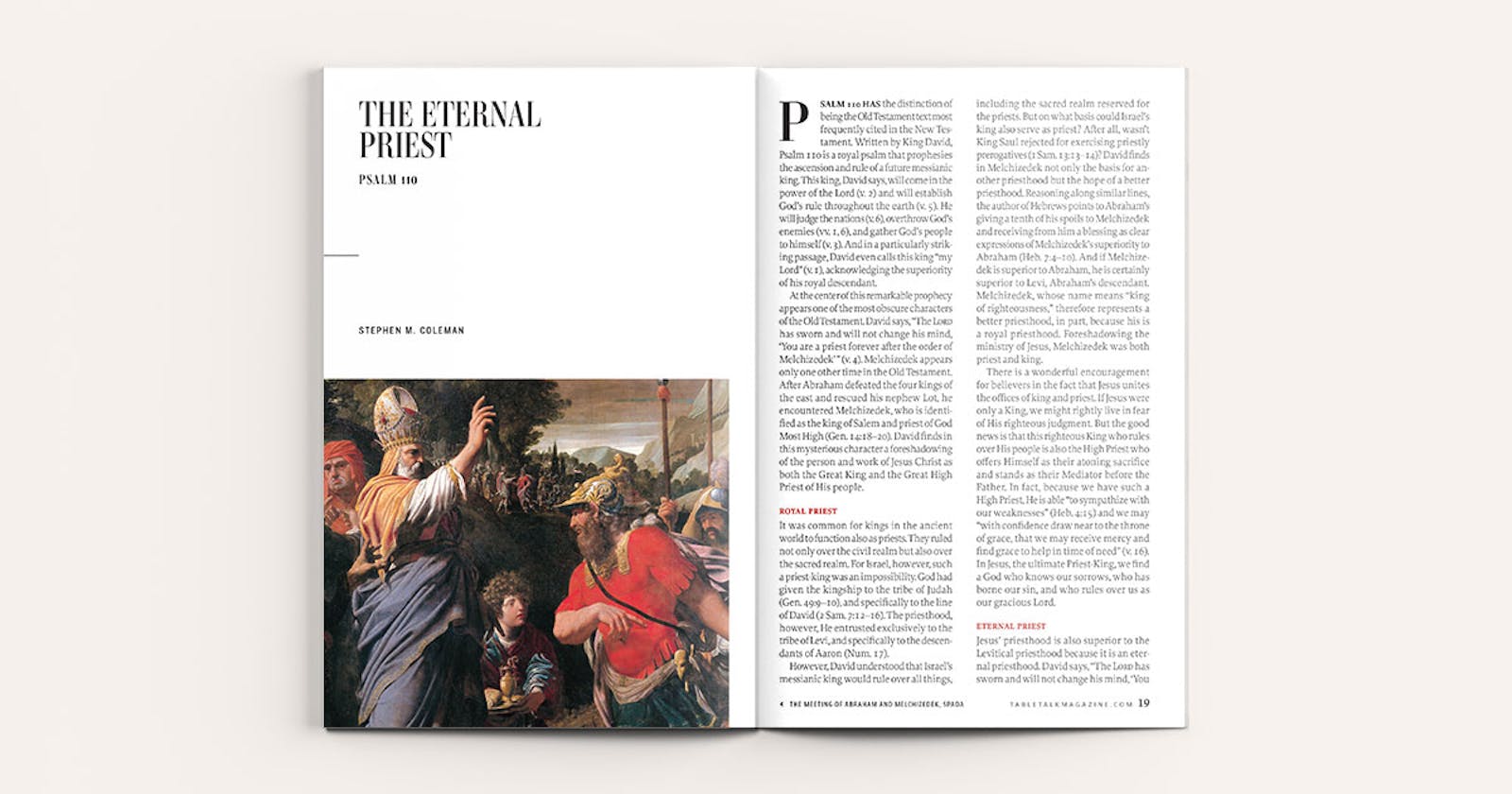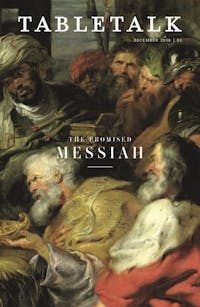
Request your free, three-month trial to Tabletalk magazine. You’ll receive the print issue monthly and gain immediate digital access to decades of archives. This trial is risk-free. No credit card required.
Try Tabletalk NowAlready receive Tabletalk magazine every month?
Verify your email address to gain unlimited access.
Psalm 110 has the distinction of being the Old Testament text most frequently cited in the New Testament. Written by King David, Psalm 110 is a royal psalm that prophesies the ascension and rule of a future messianic king. This king, David says, will come in the power of the Lord (v. 2) and will establish God’s rule throughout the earth (v. 5). He will judge the nations (v. 6), overthrow God’s enemies (vv. 1, 6), and gather God’s people to himself (v. 3). And in a particularly striking passage, David even calls this king “my Lord” (v. 1), acknowledging the superiority of his royal descendant.
At the center of this remarkable prophecy appears one of the most obscure characters of the Old Testament. David says, “The Lord has sworn and will not change his mind, ‘You are a priest forever after the order of Melchizedek’ ” (v. 4). Melchizedek appears only one other time in the Old Testament. After Abraham defeated the four kings of the east and rescued his nephew Lot, he encountered Melchizedek, who is identified as the king of Salem and priest of God Most High (Gen. 14:18–20). David finds in this mysterious character a foreshadowing of the person and work of Jesus Christ as both the Great King and the Great High Priest of His people.
Royal Priest
It was common for kings in the ancient world to function also as priests. They ruled not only over the civil realm but also over the sacred realm. For Israel, however, such a priest-king was an impossibility. God had given the kingship to the tribe of Judah (Gen. 49:9–10), and specifically to the line of David (2 Sam. 7:12–16). The priesthood, however, He entrusted exclusively to the tribe of Levi, and specifically to the descendants of Aaron (Num. 17).
However, David understood that Israel’s messianic king would rule over all things, including the sacred realm reserved for the priests. But on what basis could Israel’s king also serve as priest? After all, wasn’t King Saul rejected for exercising priestly prerogatives (1 Sam. 13:13–14)? David finds in Melchizedek not only the basis for another priesthood but the hope of a better priesthood. Reasoning along similar lines, the author of Hebrews points to Abraham’s giving a tenth of his spoils to Melchizedek and receiving from him a blessing as clear expressions of Melchizedek’s superiority to Abraham (Heb. 7:4–10). And if Melchizedek is superior to Abraham, he is certainly superior to Levi, Abraham’s descendant. Melchizedek, whose name means “king of righteousness,” therefore represents a better priesthood, in part, because his is a royal priesthood. Foreshadowing the ministry of Jesus, Melchizedek was both priest and king.
There is a wonderful encouragement for believers in the fact that Jesus unites the offices of king and priest. If Jesus were only a King, we might rightly live in fear of His righteous judgment. But the good news is that this righteous King who rules over His people is also the High Priest who offers Himself as their atoning sacrifice and stands as their Mediator before the Father. In fact, because we have such a High Priest, He is able “to sympathize with our weaknesses” (Heb. 4:15) and we may “with confidence draw near to the throne of grace, that we may receive mercy and find grace to help in time of need” (v. 16). In Jesus, the ultimate Priest-King, we find a God who knows our sorrows, who has borne our sin, and who rules over us as our gracious Lord.

Eternal Priest
Jesus’ priesthood is also superior to the Levitical priesthood because it is an eternal priesthood. David says, “The Lord has sworn and will not change his mind, ‘You are a priest forever’ ” (Ps. 110:4). In contrast to the Levitical priests, for whom genealogy was essential to establish their legitimacy, there is no record of Melchizedek’s genealogy in Genesis or anywhere else. There is no record of his birth or his death, his lineage or his descendants. As the author of Hebrews astutely notes, the presentation of Melchizedek in Genesis 14 lends an eternal quality to him, a quality that foreshadows the eternal character of Jesus’ high priesthood (Heb. 7:3).
One of the liabilities of the Levitical priesthood was that those who served as priests had the unfortunate habit of dying. Thus, just as there was for Israel a constant need for new sacrifices, there was likewise a constant need for new priests. But Jesus’ priesthood is different. He is a Priest forever. Because of His sinlessness, even after Jesus offered Himself as the perfect and final sacrifice, death could not hold Him (v. 16). And so He stands forever at the right hand of the Father.
For believers in Christ, Jesus’ eternal high priesthood should be a daily source of comfort. It is a reminder that when we forget God, He has not forgotten us. When we, through our disobedience, forsake God, we can know that He has not forsaken us (Heb. 13:5). We have a perfect Mediator in heaven pleading the merits of His own blood shed for us, drawing us back to God through repentance and faith in Him alone. Psalm 110 anticipates and celebrates the advent of this eternal Priest-King, Jesus Christ.
